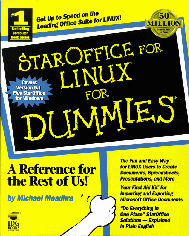

 |
 |

The quick summary is that this is a somewhat strange book. I had intended to say something like ``good'' or ``bad'', but neither word fits--``strange'' does.
The book is organized into eight parts with multiple chapters plus an appendix on installing StarOffice. The first part has general information on StarOffice. The next five parts cover StarWriter, StarCalc, the graphics pieces of StarOffice (StarDraw, StarImage and StarPresents), StarSchedule and StarBase. The last two parts include how to configure StarOffice for an Internet connection and a number of tips.
On the good side, there is a reasonable amount of useful information to help someone new to StarOffice get up to speed. The ideas are presented clearly, with illustrations where needed. It is also very easy to skip to the section of interest, StarCalc for example, and just start reading. As long as you either knew the basics or read Part I, you should be fine.
Now, about the strange stuff. First, in spite of the book's title, it also covers StarOffice for MS Windows. I find this a little strange, and more importantly, distracting. When you are reading about how to use a new application--particularly a large, complicated one--you don't need this sort of distraction.
The next weird thing is the ``cheat sheet'' in the front of the book. This is very common for this series of books, but the content doesn't make sense. With all the possible things a reader might want on a reference card, IDG chose to define what the icons mean on the various toolbars. If you have ever used StarOffice, you probably know that if you leave the mouse pointer over an icon, the function of the icon is displayed.
The system configuration chosen by the author is also a little odd. It is Red Hat Linux 5.2 with KDE 1.1 and StarOffice 5.1. The default Red Hat 5.2 system didn't run KDE. While StarOffice should run with any window manager, this deviation from the standard distribution is not explained. Also, the installation appendix covers installing StarOffice from StarDivision, not Sun. Things have changed significantly since Sun bought the product.
While I am on the subject of installation, I should mention StarOffice 5.1 automatically adds StarOffice to the KDE panel. The author, however, has you bring up a terminal window to start StarOffice. This makes no sense, as there is no need to associate a terminal with the program. Even if the author didn't want to use the icon, using the ALT-F2 key sequence to bring up a command line would be more appropriate.
The author's background will shed some light on this subject. While he has written other books and clearly has software experience, there is no indication that he has any Linux experience.
I have other nits to pick with the book. For example, the ``Entering Chart Data'' for StarChart first insists that you must manually enter all your data. Then, it goes on to show how you can embed a chart in a StarCalc spreadsheet using the spreadsheet data. An introductory sentence indicating an alternative was coming would have made the reader feel much better.
In the chapter titled ``Creating and Editing Images'', a ``Linux-only'' note talks about file and directory permissions. Unfortunately, it is written backwards (mixing up cause and effect) and is also incorrect.
That's about it from my end. The book does cover a lot of what you need to know about StarOffice, but it certainly isn't perfect. My recommendation is to look at the other book(s) available or wait for the second edition, which hopefully will have been technically edited by a Linux person.
Sid Wentworth is enjoying life on the Olympic Peninsula and resists any and all efforts to entice him back to Uzbekistan.